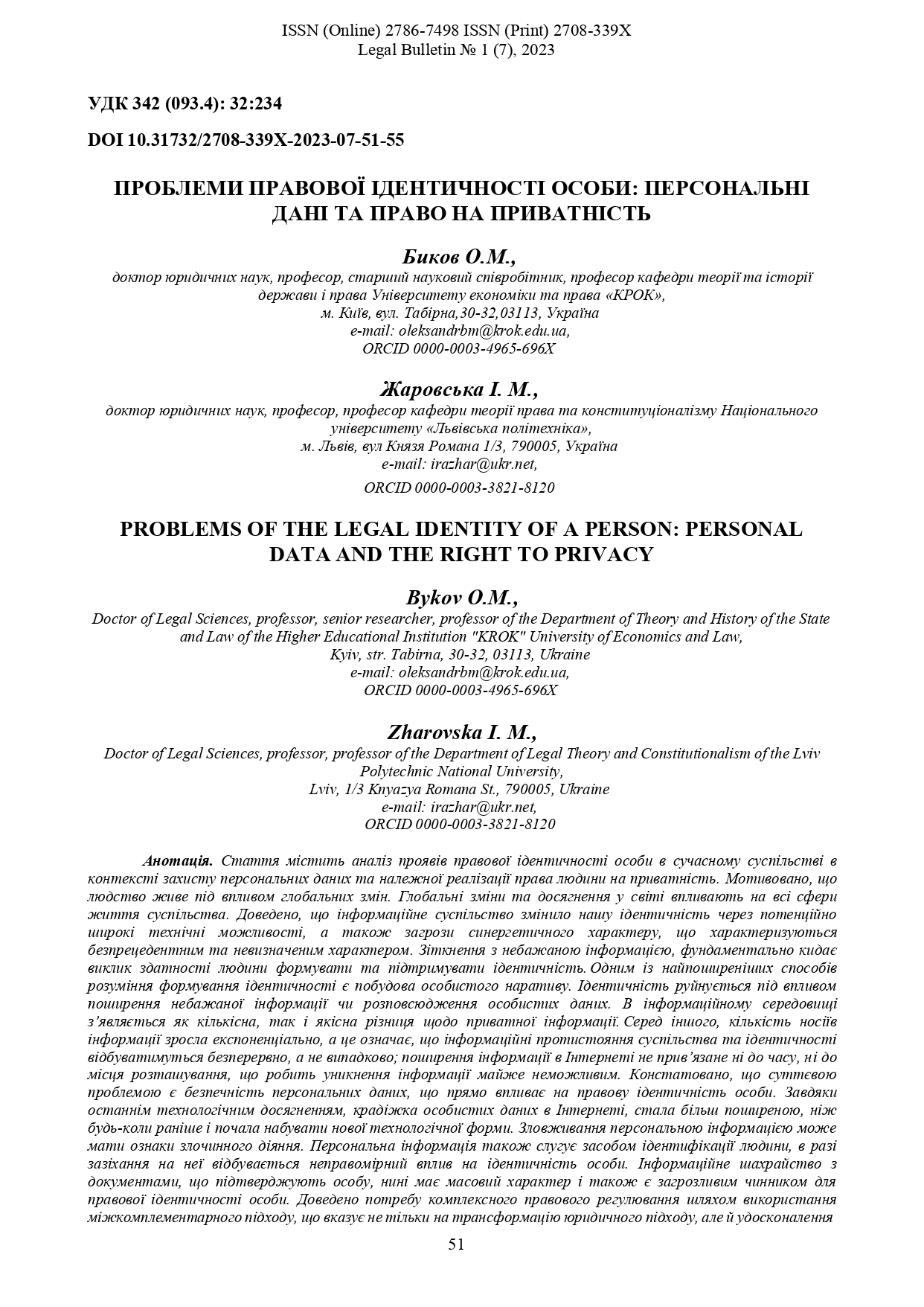PROBLEMS OF THE LEGAL IDENTITY OF A PERSON: PERSONAL DATA AND THE RIGHT TO PRIVACY
DOI:
https://doi.org/10.31732/2708-33X-2023-07-51-55Keywords:
right to privacy, legal identity, information society, personal data, globalized society.Abstract
The article contains an analysis of the manifestations of a person's legal identity in modern society in the context of the protection of personal data and the proper implementation of the human right to privacy. It is motivated that humanity lives under the influence of global changes. Global changes and achievements in the world affect all areas of society. It has been proven that the information society has changed our identity due to potentially wide technical opportunities, as well as threats of a synergistic nature, which are characterized by an unprecedented and uncertain nature. Confronting unwanted information fundamentally challenges a person's ability to form and maintain an identity. One of the most common ways of understanding identity formation is through the construction of a personal narrative. Identity is destroyed by the spread of unwanted information or the spread of personal data. In the information environment, there is both a quantitative and a qualitative difference with respect to private information. Among other things, the number of information carriers has grown exponentially, which means that the information confrontations of society and identity will occur continuously, not randomly; the dissemination of information on the Internet is not tied to time or location, making it almost impossible to avoid information. It was established that a significant problem is the security of personal data, which directly affects the legal identity of a person. Thanks to recent technological advances, online identity theft has become more common than ever before and has begun to take on a new technological form. Information fraud with identity documents is currently widespread and is also a threat to a person's legal identity. The need for comprehensive legal regulation is proven by using an inter-complementary approach, which indicates not only the transformation of the legal approach, but also the improvement of technological and organizational guarantees of ensuring legal identity.
References
Ergashev I., Farxodjonova N. (2020) Integration of national culture in the process of globalization. Journal of Critical Reviews, 7 (2).
Macaulay S. (2020) The New Versus the Old Legal Realism: “Things Ain’t What They Used To Be” Selected Works, 133. ISBN : 978-3-030-33929-6.
Surden H. (2019) Artificial Intelligence and Law: An Overview Georgia State University Law Review, Colorado Law Legal Studies Research Paper, 35 (19-22).
van der Sloot B. (2021) The right to be let alone by oneself: narrative and identity in a data-driven environment, Law, Innovation and Technology, 13:1, 223-255, DOI: 10.1080/17579961.2021.1898315.
Lee C.S. 2020. A crime script analysis of transnational identity fraud: migrant offenders’ use of technology in South Korea. Crime Law Soc Change, 74, 201–218. https://doi.org/10.1007/s10611-020-09885-3.
UNODC (2010) Report of observations and conclusions of the session on the use of forensic sciences to combat and prevent identity-related crime, 21–22 January 2010, 4th Meeting of the International Core Group of Experts on Identity-Related Crime, Vienna, Austria, 18–2. In Integration and coordination of efforts by the United Nations Office on Drugs and Crime and by Member States in the field of crime prevention and criminal justice (Issue E/CN.15/2010/CRP.2). Commission on Crime Prevention and Criminal Justice of the United Nations, United Nations Office on Drugs and Crime.
Baechler S.(2020) Document Fraud: Will Your Identity Be Secure in the Twenty-first Century?. Eur J Crim Policy Res, 26: 379–398. https://doi.org/10.1007/s10610-020-09441-8.
Europol. (2017) European union serious and organised crime threat assessment. Report Organised Crime (SOCTA/OCTA). URL: https://www.europol.europa.eu/activities-services/main-reports/european-union-serious- and-organised-crime-threat-assessment-2017.
Ferdous M.S., Chowdhury F., Alassafi M.O. (2019) In Search of Self-Sovereign Identity Leveraging Blockchain Technology, IEEE Access, 7:103059-103079, doi: 10.1109/ACCESS.2019.2931173.
Ishaq A. (2015) The Interaction Between Artificial Intelligence and Identity & Access Management: An Empirical study IJCRT, 3, 1: 668-671.

Downloads
Published
How to Cite
Issue
Section
License
Copyright (c) 2023 Биков О.М., Жаровська І.М.

This work is licensed under a Creative Commons Attribution 4.0 International License.




